

Buenos Aires
November 19, 2025
A conference shaping the future of public goods funding, financial access, and privacy.

400+
Expected Participants
50+
Speakers
The 14th edition of Funding the Commons brings together builders, researchers, and funders to ask:
How do we build systems that unlock real solutions for real communities?
Set in Argentina
This edition of FtC grounds public goods innovation in the urgency of the present. Our focus is RealFi: infrastructure for the real world and tools designed to be used.


What to expect?
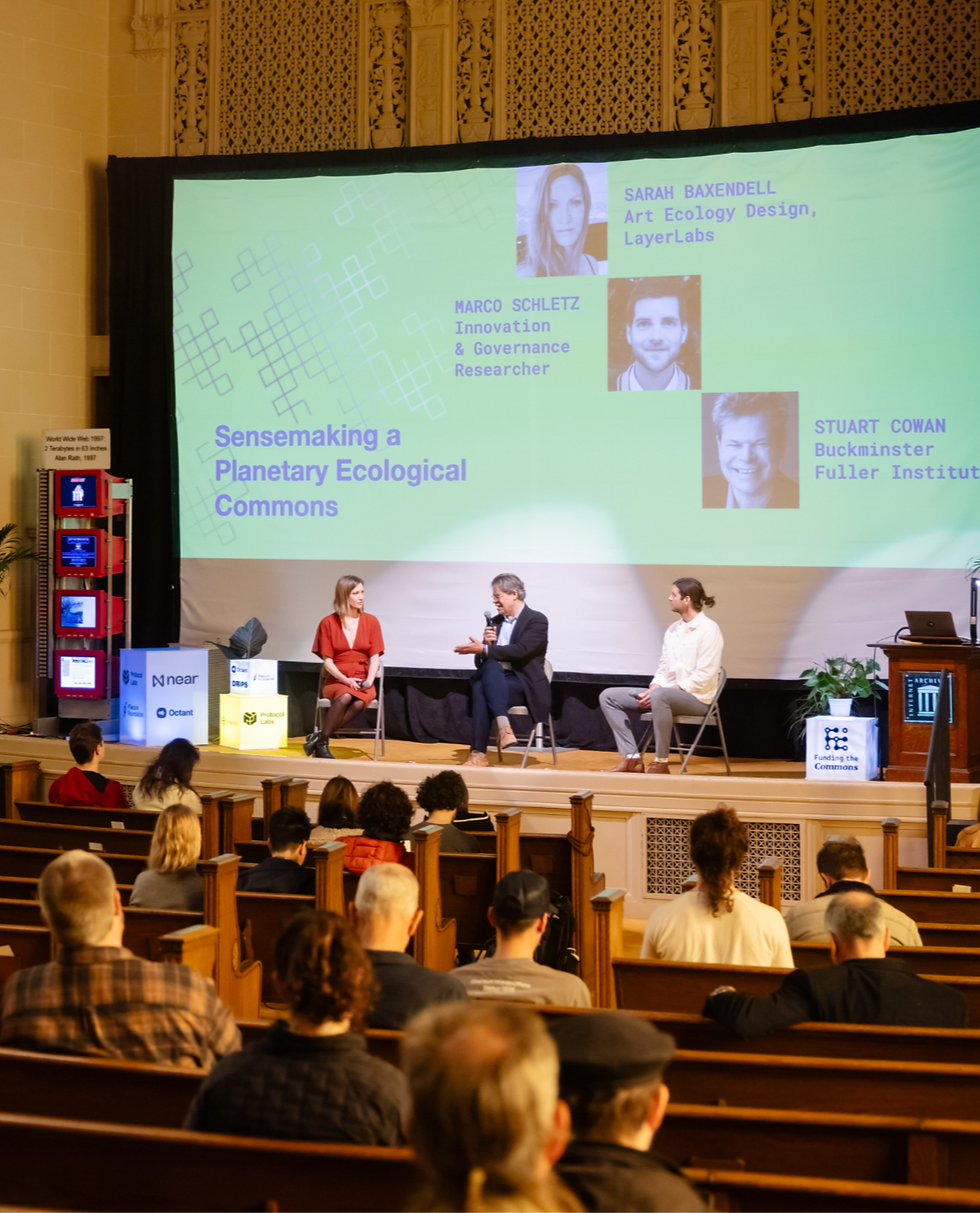
Talks and panels with builders, researchers, funders, and policymakers

Demos from the Funding the Commons Argentina Residency

Workshop sessions to advance practical solutions for the real world

Office hours with civic partners, mentors, and aligned funders
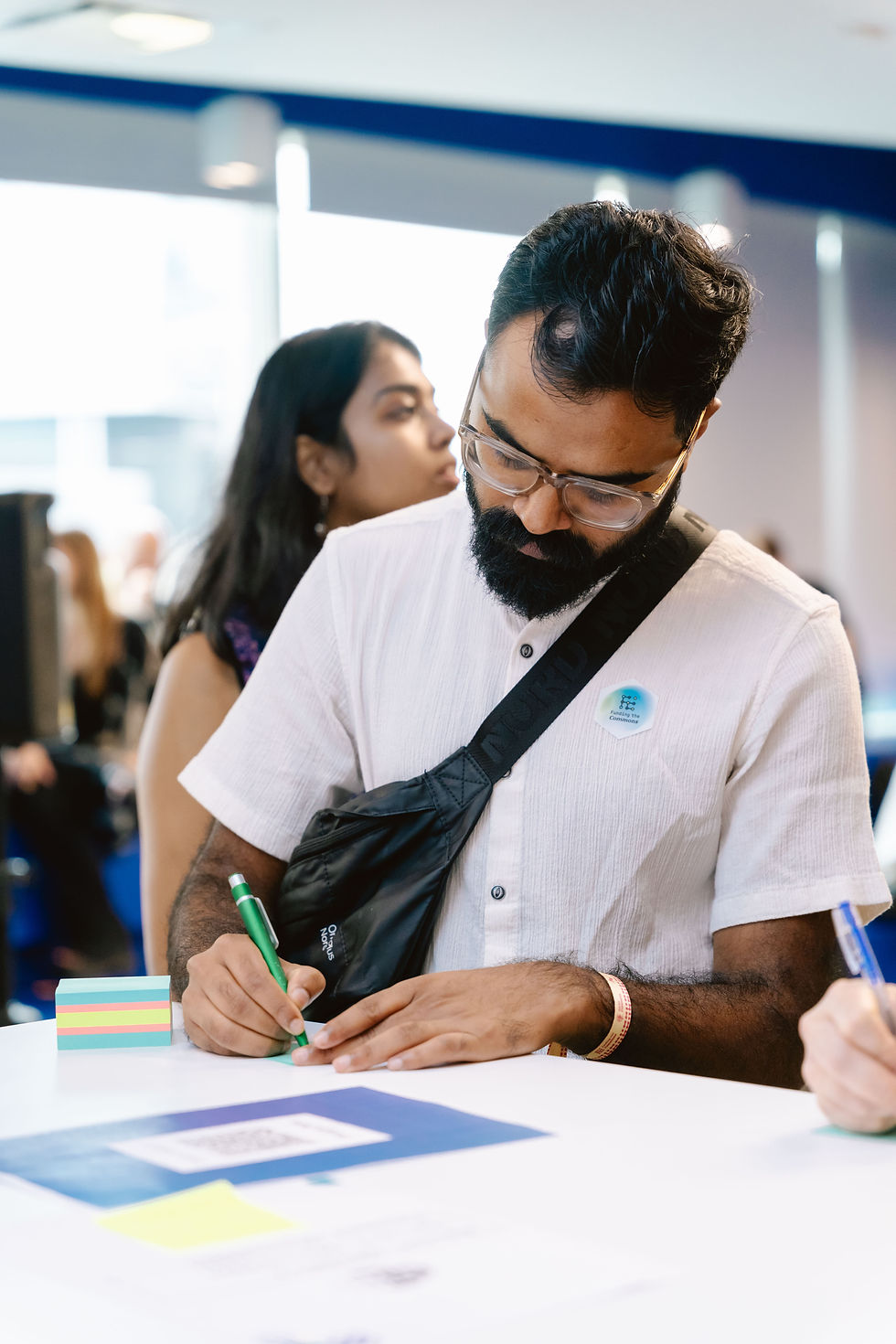
Strategic conversations on funding pathways, governance models, and real-world pilots

The Funding the Commons community has blown me away. To have such a unique, talented, smart group of people all in one room—people from very different walks of life and organizations who deeply care about the mission and advancing the space forward—is incredible.
Jarrod Barnes
Head of Ecosystem, NEAR Foundation
RealFi meets Argentina
RealFi Meets Argentina
Argentina has long been a proving ground for financial and civic innovation. Builders here respond to economic uncertainty, capital controls, and institutional fragmentation with real tools designed for everyday use.
From early experiments in digital democracy like DemocracyOS, to crypto-native financial platforms like Ripio and Buenbit, to public interest initiatives like Quinto Impacto and Open Collective, local teams have consistently developed infrastructure grounded in practical need and collective purpose.
At Funding the Commons: Buenos Aires, we’ll explore problems that matter to everyday life—how to send money across borders, coordinate shared treasuries, participate in governance, verify identity with privacy, build open AI for the public good, and protect shared environmental resources. Hosting the event during DevConnect is a chance to connect these challenges with global builders.
RealFi Hack Tracks
.png)
Funding Systems
Transparent, flexible ways to allocate shared resources.

Financial Access:
Savings, payments, and money tools for people outside traditional rails.

Coordination Infrastructure:
Tools for groups to act, govern, and respond—online or off.

Identity & Trust:
Privacy-first systems for verification, reputation, and credentials.

AI for Public Use:
Auditable, small-scale models that serve real community needs.

Climate and Commons Governance:
Bioregional governance and climate-aligned infrastructure.
Conference Tracks
%20copy.png)
Funding Systems
New ways to move and allocate shared resources: grants, treasuries, quadratic flows, and programmable funding.

Financial Access
Payments, savings, remittances, credit, and stablecoin tools designed for everyday use where traditional rails fall short.

Coordination & Governance
Tools for collective action, civic participation, shared ownership, and bottom-up governance in both digital and physical communities.

Identity & Trust
Verification, credentials, and portable reputation systems that prioritize privacy and autonomy.

AI for Public Use
Auditable, open AI models built to support coordination, decision-making, and public infrastructure.

Climate & Commons Governance
Systems for tracking, managing, and protecting shared environmental resources through open data and collaborative governance.
Speakers

Vitalik Buterin
Founder
Ethereum

Roger Dingledine
Co-Founder
The Tor Project

Juan Benet
Founder & CEO
Protocol Labs

Jarrad Hope
Co-Founder
Logos

Arun Maharajan
Blockchain Lead
UNICEF Office of Innovation

Holke Brammer
Founder & Director
Hypercerts Foundation

Devansh Mehta
Lead AI x Public Goods & Governance
Ethereum Foundation

Julian Zawistowski
Director
Golem Foundation

Nanak Nihal Khalsa
Co-Founder
human.tech by Holonym Foundation

Shady El Damaty
Co-Founder & CEO
human.tech by Holonym Foundation

María Fernanda Díaz
Abogada y Magíster en Magistratura y Gestión Judicial
Juzgado de Paz y Contravencional de Lavalle

Henry Baiz
Founder & CEO
Gane

Federico Ast.
Founder & CEO
Kleros

Luuk Weber
Ecosystem Builder
Celo PG / Ethereum for the World

David Casey
Founder
Funding the Commons

James Farrell
CTO
Funding the Commons

Charlotte Fradet
Community Builder
Funding The Commons

Claudio Cossio
Co-Founder
Meta Pool

David Dao
Co-Founder & Chief Scientist
GainForest

Guillermo Goncalvez
CEO
El Dorado

Leonardo Arias Fonseca
Researcher
Flashbots

Martin Strobl
Token Economist
Logos

Louise Borreani
Co-Founder & Green Blockchain Expert
Ecofrontiers

Anke Liu
Ecosystem Growth Lead
Stellar Development Foundation

Ariel Eiberman
Latam Director
Gnosis Pay

Hadar Rottenberg
Tech Lead
GoodDollar

Francisco Catrileo
Co-Founder and CPO
PaltaLabs

Raymond Cheng
Co-founder
Kariba Labs

Akli LE COQ
Ex inspector of Public Finances
Cryptoassets referent

Fintan Halpenny
Maintainer
Radicle

Esteban Iglesias
Founder and CEO
PaltaLabs

Jaydeep Korde
Founder CEO
Launchnodes & Impact Stake

James Tunningley
Co-Founder & Senior Advisor, ARCHITECT & Network Lead
Protocol Labs

Eliza Pancake
--
Ethereum Foundation

Alon Shavit
Co-Founder & CEO
Upright Ventures

Joaquin Soza
Co-Founder and CTO
PaltaLabs

Teodor Petricevic
Digital Partnerships and Accelerator Lead
UNDP AltFinLab

Shaun Johnson
Ecosystem
Stellar Development Foundation

Héctor Rocha
Full Professor of Strategy & Entrepreneurship
IAE Business School

Fernando Boiero
Co-Founder & CTO
Xcapit

Sarah Johnstone
Co-Founder & CEO
Relay Funder

Rica Amaral
Creative Strategist & Growth Leader
Vocdoni

Jordi Pinyana
President
Vocdoni

Beth McCarthy
Program Director
Web3privacy Now

Belén Burgstaller
Directora Ejecutiva
Mujeres 2000

Alisher Sherali
Designer
Keycard

John Guilding
Team Lead
Ethereum Foundation

Victor Martins
Staff Software Engineer
The Aha Company

Shinya Mori
Co-Founder
Imi & Beacon Labs

Andrej Berlin
Founder, Business Manager & Organizational Designer
Deep Work Network

Václav Pavlín
Technology Enthusiast
Logos
Jake Hartnell
Layer Labs
Jake Hartnell is the CEO and Co-Founder of Layer.xyz, a cutting-edge platform focused on building decentralized infrastructure for the Web3 ecosystem. At Layer.xyz, Jake leads the strategic vision and drives innovation, aiming to advance blockchain technology's role in decentralized finance (DeFi) and governance. Before Layer.xyz, Jake co-founded Juno, an interchain launchpad enabling dApps to quickly find their audience, and Stargaze, a protocol for NFTs within the Cosmos ecosystem. His deep involvement in DAOs led to the creation of DAO DAO, a no-code platform for decentralized organization management. Jake's current focus is on expanding the Ethereum ecosystem and exploring innovations with projects like EigenLayer to enhance Layer 2 solutions and decentralized infrastructure. Areas of Expertise: ● Ethereum and Layer 2 solutions ● Decentralized Finance (DeFi) and blockchain infrastructure ● Decentralized Autonomous Organizations (DAOs) and governance models ● Interoperability across multi-chain ecosystems
Ethan Frey
Layer Labs
Ethan Frey is the Chief Technology Officer (CTO) and Co-founder at Layer.xyz, where he drives the development of decentralized infrastructure with a focus on Actively Validated Systems (AVS) to enhance blockchain security and efficiency. His technical leadership aims to push the boundaries of innovation in Web3 by creating scalable and secure solutions that support decentralized finance and governance. Before joining Layer.xyz, Ethan founded CosmWasm, a secure and performant smart contract platform that facilitates multi-chain interoperability. He also led Confio GmbH, advancing open-source blockchain protocols and tools, and architected Mesh Security, a bi-directional “restaking-like” protocol for the Cosmos ecosystem. Ethan’s extensive contributions to blockchain technology include writing the original specification and implementation of the Inter-Blockchain Communication (IBC) protocol, as well as building the first version of the Cosmos SDK, solidifying his role as a key innovator in the Cosmos ecosystem. Currently, Ethan's work at Layer.xyz includes expanding capabilities in the Ethereum and EigenLayer ecosystems while advancing AVS technology to redefine how smart contracts and decentralized systems verify data. Areas of Expertise: Custom Blockchain Development (Cosmos SDK, CosmWasm) Actively Validated Systems (AVS) Blockchain infrastructure and decentralized finance (DeFi) Ethereum ecosystem and Layer 2 solutions Multi-chain interoperability and distributed governance
Eileen Wagner
Decent Patterns
Eileen works in privacy, security, and decentralization and advises teams and organizations on UX design and research. Her focus is on content and interaction design -- and anything that helps people make sense of complex technologies. She enjoys facilitating relationships between the builders and users of technology, and works across for-profit and non-profit sectors.
Tara Merk
CNRS/ Weizenbaum Institute
Tara is a political science PhD candidate at the CNRS/ University Paris II, a research fellow at The New School in New York and associate researcher at the Weizenbaum Institute in Berlin. Her research focuses on Exit to Community, i.e. converting companies in the digital platform economy into community ownership and governance. She previously worked as a strategy analyst, educator and research consultant in the blockchain industry after studying in Maastricht, Hong Kong, and Dublin where she completed her MSc in the field of information systems management focusing on institutional entrepreneurship in Bitcoin.
Georgy Ishmaev
Inria (National Institute for Research in Digital Science and Technology), France
I am an interdisciplinary researcher working on Ethics of Technology and Computer Science. I did my PhD in Ethics of Technology research on moral values in decentralized systems at Delft University of Technology (the Netherlands). I worked as a Postdoc at the Distributed Systems Section of Delft University for four years, working on identity management solutions, benchmarking of blockchain protocols, decentralized reputation, and MEV mitigation tools. I now work as a researcher at Inria, Distributed Systems at the University of Rennes (France). My current research is focused on ethics of blockchain applications, ethical risk analysis for decentralized systems, and identity management.
Grayson Earle
Artist, Bail Bloc
Grayson Earle is a new media artist and educator. He has taught at Oberlin College, The New School, and the City University of New York. He is the creator of Bail Bloc and a member of The Illuminator art collective. He is currently participating in the Braunschweig Projects artistic residency program. Earle’s work uses the context of art to materialize ideas and forms surrounding the role that digital technologies and networks can play in protest and political agency. He exhibits both inside and outside traditional art spaces, working with guerrilla video projection, cryptocurrency, machine learning, simulation, sculpture, and the internet. He has held fellowships at Akademie Schloss Solitude, ZK/U, Ujazdowski Castle Centre for Contemporary Art, and Pioneer Works. His work and research have been presented at institutions including The Whitney Museum of American Art, MoMA PS1, Radical Networks, the Magnum Foundation, and Open Engagement. Recent exhibitions include the Brooklyn Museum (USA), Centro de Cultura Digital (Mexico), KateVass Galerie (Switzerland), and The Red House (Taiwan).
Zsofia Samodai
Community Researcher, Wyvern Art Fund
Zsofia Samodai is Community Researcher at Wyvern Art Fund, coorganizing events and designing protocols that aid collaboration and value social and embodied aspects of artistic creation and reflection. They have graduated with a masters degree in Science, Technology and Society and Brain Science. They use somatic practices as reflection tools on our habits as humans on various levels, ranging from the personal, psychological, cultural to social and systemic, arriving at conclusions from an embodied perspective that precedes theory. They collaboratively practice a mutual aid social protocol called The Hologram and occasionally host consent workshops.

Sean
Aztec Labs
Full Stack Engineering at Aztec Labs, work ranging from zkvm research - peer to peer networking - compilers
Katia Lukicheva
Decoland
Katia Lukicheva is a systems strategist working at the intersection of civil society, philanthropy, and emerging technologies to rethink how we fund, govern, and sustain public goods. She brings two decades of experience across grassroots activism and civil society movements, policy design, global philanthropy, and financing institutions — shaping advocacy, developing funding strategies, and enabling movement-led change. Throughout her work, she has challenged how power, politics, and money shape access to and delivery of public goods. She has built ecosystems of actors to expose and resist harmful funding practices, demand accountability, and develop alternative approaches that push for more equitable resource allocation. Today, Katia leads Decoland, a strategic design lab exploring how responsible digital innovation — including Web3, blockchain, and digital public goods — can enable plural, ethical, and community-aligned models for civil society finance. She is developing the Civic Resilience Stack, a systems framework that helps civil society and tech ecosystems map how governance, identity, capital, and assets can work together to support communities as co-stewards of resilient infrastructure. She also leads CivicChain, an initiative prototyping bridges between civil society and emerging tech through capacity building, strategic learning, and pilot development. Through CivicChain, she is co-developing pilots with funders and civic actors to test new governance structures, unlock mission-aligned capital, and create practical onramps between Web2 and Web3 ecosystems. Katia specializes in designing ecosystem strategies and enabling environments where funders, technologists, and civic actors can collaborate to explore, co-create, and pilot real-world solutions. From funding flows and governance models to narrative tools and interoperability infrastructure, she assembles the partnerships, mechanisms, and shared frameworks that turn cross-sector ambition into community-led action.
Andrej Berlin
Deep Work Network
Andrej is an organizational developer with a focus on the decentralised economy. He is the founder of the design firm Deep Work, which has helped web3 startups, fortune 500 companies and open source teams design their digital products, brands, and organizations. He is an advocate for collaborative environments that support wellbeing and meaningful work as an integral part of life.
Andreas Arnold
Platform Coops eG
Andreas Arnold is an industrial engineer, social entrepreneur, and expert in cooperative business models and financing. He serves on the board of Platform Coops eG and has long supported startups, founder teams, and companies working on social innovation and cooperative platform models. To help shape the cooperative digital economy in Germany and Europe, Andreas is actively engaged in the Web3 space—particularly in the areas of blockchains and decentralized autonomous organizations (DAOs). He previously led the digital transformation and marketplace development of the freelancer cooperative SMartDe eG, coordinated the marketplace strategy for the blockchain-based UBI project Circles, and advised its partner organization Circles Coop eG. Most recently, he co-founded coopDAO, a new initiative building bridges between the cooperative economy and Web3 technologies.
Anna Ehrenstein
Artist, freelance and HGB professor
Born in 1993 in Germany, Anna Ehrenstein lives and works between Berlin and Tirana. Her work has been featured in numerous solo exhibitions, including: Museum Villa Stuck, Munich; C/O Berlin; Francisco Carolinum, Linz; Kunstverein Braunschweig; Weserburg Museum für moderne Kunst Bremen; Goethe-Institut, New York; Melkweg Expo, Amsterdam; KOW and Office Impart, Berlin. She has participated in major international biennials, including the Lagos Biennial (2024), The New Visions Triennial Oslo (2023), Biennale für aktuelle Fotografie (2022), and the Ural Industrial Biennial (2021). In 2026, her work will be featured at the Quebec Biennial, and in 2025 as a collateral of the Kiew Biennial at the Museum Of Modern Art in Warszawa. Additionally she has also taken part in group exhibitions at institutions such as: Museum Folkwang, Essen; Kunsthaus Hamburg; Museum of Modern Art, Warsaw; Heidelberger Kunstverein; Maxim Gorki Theater, Berlin; Shrine Empire Gallery, New Delhi; Bag Factory, Johannesburg; Pablo’s Birthday, New York; Galerija Škuc and City of Women Festival, Ljubljana; Circulation(s) Festival, Paris and Les Rencontre D'arles, among others. Her interdisciplinary practice engages with post-digital imaginaries, diasporic identities, spiritual coalition and the aesthetics of networked realities, often through collaborative and transmedial formats.
Caroline Paulick-Thiel
Politics for Tomorrow / nextlearning e. V.
Caroline Paulick-Thiel is a strategic designer and director of Politics for Tomorrow, a non-partisan initiative that aims to enhance the innovation capacity of the public sector to facilitate transformative change processes. They work at the intersection of government and civil society, focusing on commons-public partnerships.
Kat Young
Founder, ethevacuations
Kat is a startup builder in the Ethereum ecosystem. Most recently she was Head of Product at Gitcoin, building protocols and mechanisms for funding open source software. Previously she was Head of Product at Zora, a protocol for funding creators on the internet, and in her past life she built tools for musicians at companies such as Ableton, SoundCloud and BCG Digital Ventures. She is the founder of ethevacuations, an initiative to fundraise crypto for evacuations from Gaza.
Ben Biedermann
Managing Director, ACURRAENT UG
Ben is a RaidGuild member and an expert on decentralised identity and Web3 infrastructure, who also reads for a PhD in DLT-based decentralised governance of small jurisdictions. As an entrepreneur, he successfully launched two Web3 consultancies in the past three years and received funding backed by the European Union on multiple occasions.
Simone Robutti
Organizer, Tech Workers Coalition
Simone Robutti is a former software engineer turned organizational consultant, serving primarily co-operatives, democratic workplaces, and associations . He has been politically active, among other things, within Tech Workers Coalition for more than 6 years. More recently, he joined Reversing.works to work on digital investigations against digitally-mediated labor platforms (i.e. food delivery and data workers gig platforms)
Charlie Fisher
Founder, Komma
Charlie is known for his advice, research and activism on operationalising the long-term stewardship of land, particularly in the pursuit of urban affordable housing. He is a Co-founder of Komma, a research-action agency whose team have spent more than a decade working with citizens, municipalities, philanthropy and the construction sector to conceptualise a new civics catalysed by decentralised technology. With a background in architecture, he is completing a PhD in Spatial Planning and was on the team that launched the first tokenised land trust.
Rainer Rehak
Associate Researcher, Weizenbaum Institut
Rainer Rehak is part of the research group “Digitalization, Sustainability, and Participation” at the Weizenbaum Institute for the Networked Society, he is an associated researcher at the Berlin Social Science Center (WZB) and is currently doing his PhD on systemic IT security and societal data protection at the TU Berlin. He studied computer science and philosophy in Berlin and Hong Kong and has been working on the implications of the computerization of society for over 15 years. His research fields include technology impact assessment, collective data protection, systemic IT security, state hacking, computer science and ethics, fictions of technology, digitization and sustainability, convivial and democratic digital technology, epistemics of automation, digital (de-)colonialism, and the implications and limits of AI systems. He also publishes regularly in non-scientific outlets and is an expert witness for parliaments (e.g., the German Bundestag) and courts (e.g., the German Constitutional Court). Together with other digital policy and environmental organizations, he initiated the "Bits & Bäume" conference for digitization and sustainability.
Ela Kagel
co-founder & board member, Platform Coops eG
Ela Kagel is a digital strategist and expert in commons-based economies, organisational design, and cooperativism. For over two decades, she has been creating spaces that foster cultural exchange, digital innovation, and collective empowerment. Since the 1990s, Ela has been instrumental in developing networks and platforms that challenge extractive models of technology and economics. In 2010, she co-founded SUPERMARKT, an independent hub for digital culture and collaborative economy in Berlin. There, she has spent over a decade curating conferences, workshops, and research projects that explore cooperative practices and equitable digital infrastructures. Ela is also co-founder and board member of Platform Coops eG, a coop that supports the development of the digital, cooperative economy across sectors. In parallel, she co-founded Poetic Technologies, a collective enterprise dedicated to reimagining digital infrastructures beyond bureaucratic constraints. Past roles include artistic director of MoneyLab Berlin (2021), curator for Transmediale Festival (2009–2011), and long-time collaborator with Public Art Lab. Throughout her career, Ela has consistently bridged the cultural and digital spheres with a focus on democratic ownership, radical care, and community-led innovation.
Luiz Fernando Segala Gomes
Operations Lead, ReFi DAO
I'm the founder and lead of ReFi Barcelona and operations lead at ReFi DAO. Over the past three years, I’ve been organizing and supporting communities and programs across the ReFi and DAO ecosystems. My focus is on coordinating efforts to build interconnection within and between ReFi, Regen, Web3, and local ecosystems — catalyzing real-world adoption and supporting local groups working on the ground to advance the ecosocial transition, aligned with the spirit of Ethereum Localism and Regen Coordination. 🌿
Felix Fritsch
Founder, Commons Hub
Felix Fritsch is a political economist and community organizer working at the intersection of technology and societal transformation. With a background in political and economic theory, he crafts narratives that connect technological innovation—particularly in the blockchain and crypto space—with broader movements for systemic change. He is the founder of the Crypto Commons Association and the Commons Hub, a retreat and research venue in the Austrian Alps dedicated to exploring post-capitalist futures. Felix recently completed his PhD in Political Science at the Scuola Normale Superiore, where his dissertation, The Emergence of the Crypto Commons, explored how decentralized technologies are reshaping collective resource governance. His work combines insider ethnography with socio-technical analysis to understand how communities can repurpose blockchain infrastructure for the commons.
Olha Pylypenko
Programme Director, fx(hash)
Olha Pylypenko is a creative producer and strategist working at the intersection of digital culture, contemporary art, and emerging technologies. Her work centres on shaping collaborative projects, from early concept through to public presentation—spanning online platforms, physical exhibitions, and hybrid spaces. Currently at fx(hash), Olha leads artist-focused initiatives and public programmes that support the growth of generative art.
Fabain Vogelsteller
Founder, LUKSO & Universal Everything
Fabian Vogelsteller is a software developer and entrepreneur whose work has shaped the blockchain and Web3 space. Best known for creating the Ethereum Mist wallet and authoring the ERC-20 token standard, Vogelsteller has helped lay the technical and conceptual foundation for decentralized applications, user-friendly wallets, and tokenized economies. In Ethereum’s early days, Vogelsteller created the Mist wallet, the first user-facing application for the Ethereum blockchain. It was a major leap forward in usability, allowing users to manage their ether, deploy smart contracts, and explore dApps in a visual environment. Mist transformed the developer-centric blockchain landscape into something far more accessible for everyday users. Vogelsteller’s most notable contribution is the ERC-20 token standard, which he proposed in 2015 with Vitalik Buterin. This protocol became the backbone of Ethereum’s token ecosystem, enabling interoperability between tokens, wallets, and exchanges. The ERC-20 standard fueled the ICO wave and remains foundational to DeFi, NFT platforms, and countless crypto projects today. In addition to these innovations, Vogelsteller was a key developer of Web3.js, the JavaScript library that connects web applications to Ethereum smart contracts. This tool empowered a new generation of developers to build dApps using familiar programming languages, accelerating the growth of the decentralized web. Fabian's vision goes beyond technical innovation. A passionate advocate for decentralization and open-source principles, he believes in a Web3 that empowers users with identity, ownership, and creativity. In 2019, this vision culminated in the co-founding of LUKSO, a Layer 1 blockchain designed specifically for the social, creative, and cultural economies. LUKSO introduces Universal Profiles, a new kind of blockchain-based account built on smart contract standards. Unlike traditional wallets, Universal Profiles are modular and programmable and very human friendly. They can store digital assets, manage permissions, hold credentials, and run embedded logic. These profiles serve as decentralized identities for individuals, DAOs, companies, and even AI agents — bringing human-centric design into the heart of blockchain systems. Building on this foundation, Vogelsteller is now creating Universal Everything, the primary interface for Universal Profiles and the social layer of the New Web3. Universal Everything is not just an app, but a dynamic environment where users interact through their profiles, display digital assets, message each other, and run mini-apps. It blends Web2 familiarity with Web3 capabilities, offering a seamless experience that bridges the old internet with the new. In all of his work, Vogelsteller aims to make blockchain more inclusive, expressive, and meaningful. Whether through standards like ERC-20, tools like Web3.js, or platforms like LUKSO and Universal Everything, he continues to lead the way toward a Web3 where identity is owned by users and the internet becomes a canvas for collective creativity.
Marina Markezic
CEO, co-founder, European Crypto Initiative
Marina is the director and co-founder of the European Crypto Initiative (EUCI), a European advocacy group focused on crypto regulation. Since 2017, Marina has been working with crypto projects on governance and legal matters with a focus on decentralization, DeFi and NFTs. Marina is an expert on key crypto regulatory topics and follows the recent regulatory developments and their influence on the industry.
Shai Perednik
Principal Ecosystem Solution Architect, Near Foundation
Shai here from the Near Founder Success team! I'm a Principal Ecosystem Architect focused on building ecosystems, strategic partnerships, and technical enablement for Web3 and AI projects. I've been in tech for 30 years, from building distributed systems in the Navy to architecting enterprise-scale solutions at Deloitte and Lockheed Martin, and leading AWS blockchain initiatives. My passion today is empowering builders to accelerate their Web3 and AI solutions through clear guidance, technical frameworks, and effective go-to-market strategies. I'm especially excited about revolutionizing learning through blockchain and AI, ensuring a path for students to take ownership of their credentials and learning path.
Arvy K
Experience Designer, seks.design | Co-Founder, the Y radio
Experience Designer. We create spaces, spaces create us. New interactions need new infrastructure. How do we design spaces that catalyze new ways of relating to each other? Academic background in developmental psychology and cognitive neuroscience. Formerly behavioral therapist for children with ASD. Currently, experience designer creating open-format, multi-generational nodes for hyperlocal community regeneration.
Trent Van Epps
Founder, Operator, Protocol Guild
Former architect that has been engaging in the Ethereum community since 2016. Writing about Ethereum at trent.mirror.xyz. Started Protocol Guild in 2021 and have since scaled it to 190 members, $28mm distributed, $50mm vesting over the next 4 years. Co-coordinated the KZG trusted setup for EIP-4844, and various other core protocol projects. Creating cultural artifacts to celebrate protocol upgrades via Stateful Works, which raises funds for core development. Interested in non-state infrastructure, shared resource stewardship, solidarity primitives, politics of software, commons, capture.
Lorena Junghans
let, KINDA / The Palestine Music Space
Lorena Junghans is an award-winning impact producer, FES scholarship recipient, honors graduate of Filmuniversity Babelsberg KONRAD WOLF, won the 2022 Bertha Foundation "Artivist Award" for their collaboration with Palestinian musician Rasha Nahas and was granted the STARTBÜRO - scholarship for founders. Lorena is an alumni fellow of CIRCE (Creative Impact Research Centre Europe), the “Empower Now” bv Impact Hub, “health & wellbeing” by tbd* as well as a former resident of SOAM. As an impact producer, Lorena brings collective expertise to projects across artist management, film and virtual reality. Notable projects include Biennale di Venezia winner "From the Main Square." Lorena is part of teams at KINDA, The Palestine Music Space and CONNECTED DIFFERENCES e.v., offering systemic change for sustainable and equitable solutions.
Jocelyn Endres
Network Tickler & Facilitator, Microsolidarity Network
Jocelyn is a social change facilitator and mediator based in Berlin. She is a Coordinator of the Microsolidarity Network and specialises in designing gatherings and facilitating immersive experiences that support change-makers and community builders to foster belonging, mutual aid and real-world impact in their field of influence. Nicki studied psychology, neuroscience, and philosophy, and has trained as a coach and mediator, as well as in Microsolidarity. In recent years, he co-created and co-managed a coworking community in Berlin-Kreuzberg, Imago Space and is currently stewarding The Garden - an organisation for inner and outer regeneration. Over the past decade, Crystal has helped launch 0→1 ventures, scale startups into new markets, and grow funding platforms that facilitate billions in capital flows. Her work spans early-stage venture design, digital product innovation, business growth strategy, and multi-stakeholder coordination. Today, she partners with mission-aligned founders, funders, and ecosystems working at the edge of what’s possible—from AI and Web3 to cleantech and nature-based solutions. Her background includes institutional investment, impact finance, digital assets, and climate technology—with a strong focus on fintech for resilience, inclusive clean technologies, and digital public infrastructure that empowers the commons. Yet the most foundational system guiding her work is nature itself. You’ll find her sailing through the Caribbean, freediving alongside Indigenous communities in the Andaman Sea, or trekking the highlands of the Caucasus—attuning to the intelligence of Earth as a living, interconnected whole. At the core of her approach is a systems lens—one that doesn’t just ask how to build better tools or increase efficiency, but how technology and innovation can rewire the underlying systems to bring about a more regenerative, inclusive, and resilient future for people, other beings, and the planet. She believes the most vital work today happens in the in-between: between sectors, between silos, between the built world and the living one. Her approach blends strategic execution with inner transformation and deep ecosystem weaving. She believes the most vital work today lives in the spaces in between: between knowledge and practices, between human systems and ecological ones, between the built world and the Earth’s wisdom —between I and We. It is in these intersections that new possibilities take root—where collaboration, imagination, and regeneration converge. Crystal’s work is rooted in the principle that we are stewards of the systems we inhabit. That regeneration is not a niche, but a baseline. That collaboration—not extraction—is the currency of thriving systems. She draws from systems thinking, regenerative design, and the belief that the infrastructures we create—whether digital, financial, or technological—must be inclusive, adaptive, and community-governed. Currently, through her work at Eka Frontier—the impact-driven, climate-focused venture studio and advisory she founded—Crystal is focused on building and supporting projects, startups and platforms that harness emerging technologies such as AI, Web3, geospatial intelligence, and IoT. She takes a holistic view of capital, encompassing natural, social, human, and produced forms, with the goal of strengthening resilience across food, energy, social, and ecological systems. Whether through product design, ecosystem architecture, or venture scaling strategy, her work asks: How can we harness the tools, technologies, and infrastructures humanity has developed to flow in alignment with our intention to build a future that is inclusive, regenerative, and resilient?He studied business administration in Potsdam and Moscow and did his doctorate in Business Information Systems on the characteristics of changeable systems at the University of Potsdam. There he also set up and managed the learning factory in the Industry 4.0 Center. He was a visiting researcher at the Universities of Stellenbosch, Queensland University of Technology and Hong Kong Polytechnic University. He then worked as part of a junior research group on transformative potentials of digitally networked production for people, the environment and technology as a post-doctoral researcher at the University of Potsdam. His work focuses on the opportunities and risks of digitalisation for the socio-ecological transformation of companies and society.
Nicki Endres
Network Tickler & Facilitator, Microsolidarity Network
Nicki studied psychology, neuroscience, and philosophy, and has trained as a coach and mediator, as well as in Microsolidarity. In recent years, he co-created and co-managed a coworking community in Berlin-Kreuzberg, Imago Space and is currently stewarding The Garden - an organisation for inner and outer regeneration.
Gilberto Morishaw
Breadchain Contributor
Gilberto Morishaw is a leading techno-futurist and systems thinker who empowers leaders and organizations to navigate the complex intersection of climate, technology, and society. He inspires audiences to envision and build a regenerative future, drawing on his expertise in systems thinking, regenerative practices, and future-oriented leadership. Hailing from Curacao, he brings new perspectives from the frontlines of the societal crises facing the world today. He has addressed global audiences at prestigious forums including the World Economic Forum, the EU Parliament, COP27, and the World Bank, sharing his insights on how to create a more sustainable and equitable world. His ideas have been published in Newsweek, the WEF, The Herald and a variety of government reports. He is a contributor for Bread Cooperative and ReFiDAO. He is a co-director for the Creative Regenerative Futures Foundation, former Youth Advisor for the European Commissioner for International Partnerships, German Marshall Fund TILN Alumnus, public speaker, poet and artist. He is a Global Shaper and Davos50 Fellow for the World Economic Forum, and a board member for the Impact Economy Foundation’s 2100 movement. Gilberto has worked and contributed in many fields. From his role as Head of Impact, Equity, and Inclusion for Kolektivo, a regenerative finance startup, to his work with countless government institutions both local and global.. Gilberto helps organizations contribute towards creating a better society by enabling them with the right inspiration, wisdom and analysis needed to navigate a future that is filled with risks and crises. He is an expert in curating programs, moderating and navigating difficult conversations and has co-created programs for organizations like Pakhuis de Zwijger, Springtij, True Price and Systemic Justice. Gilberto has a background in International and European Governance and Global Impact. He leads on topics ranging from AI, climate change, and migration to systems thinking, youth and web3. Gilberto is President of the supervisory board of the Dutch Caribbean civil society foundation OCAN, a Board of Trustees member for the geopolitics firm Krijger & Partners and a societal council member for the Dutch Research Institute for the Transitions. He also advises Operal AG, a startup on impact gamification, and MoneyTri, a financial literacy and investment startup. Gilberto also has a background in activism and has organized climate marches and pushed for change on a local, national and international level.
David Casey
Director, Funding the Commons
David has worked in crypto for over a decade, focusing on ecosystem-level change through fundraising, movement-building, and blockchain-driven socioeconomic innovation. A 4x founder, he also helped scale a company to 8-figure revenue and advises several growth-stage startups. His experience spans founding, corporate roles, VC, public goods funding, event production, and ecosystem incubation. He discovered blockchain’s potential for cross-border payments in 2013 and launched his first blockchain asset on Bitcoin’s Colored Coins in 2015. David has also worked in humanitarian sectors, produced events in 10+ countries, and spoken in 25.
Hudson Headley
Chief Architect, Poa
Hudson Headley is a protocol engineer dedicated to decentralized governance, worker ownership, and innovative post-capitalist economic structures. As the creator of Poa, the Perpetual Organization Architect, Hudson designs blockchain-based tools that enable resilient, worker-owned organizations. Hudson currently serves as a developer at Breadchain Coop, with a background in computer science and economics from the University of Kansas, Hudson has developed multiple hackathon winning blockchain projects, notably earning recognition at ETH Denver. He actively contributes to open-source initiatives and secures grants to foster decentralized collaboration.
Anke Liu
Ecosystem Growth Lead, Stellar Development Foundation
As the Ecosystem Growth Lead at the Stellar Development Foundation, Anke Liu oversees programs and initiatives catalyzing innovation and expansion of the Stellar ecosystem, including the Stellar Community Fund. Her collaboration with BlockScience on the creation of Neural Quorum Governance paves the way for a new governance standard featuring liquid democracy and reputation-based voting. Anke is driven by a passion for decentralized coordination structures and impactful innovation in Web3.
Sam McCarthy
Ecosystem Lead, DAOstar
Sam McCarthy is a crypto builder, researcher, and writer. As the ecosystem lead at DAOstar, he supports the DAOstar community, publishes open-source research, and manages fundraising. He is also building a project that provides essential social infrastructure to individuals working in DAOs and addresses problems within the existing digital labor environment. McCarthy previously worked at venture studio, Spartan Labs, and consulted for marketing DAO, Myosin. He received an MSc from the London School of Economics, later publishing his dissertation on the governance practices of DeFi protocols in peer-reviewed journal, New Sociological Perspectives. His newsletter features essays on such topics as DAOs, decentralized governance, and digital public goods.
André Ullrich
Research Group Lead, Weizenbaum Institute
André Ullrich heads the research group "Digitalisation, Sustainability and Participation" at the Weizenbaum Institute for the Networked Society and is currently doing his habilitation on responsible and sustainable digitalisation. He studied business administration in Potsdam and Moscow and did his doctorate in Business Information Systems on the characteristics of changeable systems at the University of Potsdam. There he also set up and managed the learning factory in the Industry 4.0 Center. He was a visiting researcher at the Universities of Stellenbosch, Queensland University of Technology and Hong Kong Polytechnic University. He then worked as part of a junior research group on transformative potentials of digitally networked production for people, the environment and technology as a post-doctoral researcher at the University of Potsdam. His work focuses on the opportunities and risks of digitalisation for the socio-ecological transformation of companies and society.
Lukas Kunert
Senior Manager, Researcher, neosfer GmbH
Lukas Kunert is a serial founder and initiator of various initiatives. His first company was a business that produced organic underwear and unfortunately failed very quickly. After a research phase in which he focused on the topic of the future of insurance and published a research paper on it, he started a peer-to-peer insurance platform in 2018. This then pivoted to a platform for the financial transactions of groups. elinor was the first company in Germany to offer a group account for classes, teams, and other initiatives. In 2020, he and his friends founded the future-village SonnErden in the Rhön. More than 30 adults and 20 children now live in the multi-generational housing project. Responding to the outbreak of war in Ukraine in February 2022, Kunert initiated #unterkunft-ukraine, which became Germany's largest platform for connecting refugees with free accommodation, facilitating safe housing for more than 60,000 individuals. He currently works as a Senior Manager and Researcher at neosfer GmbH. With a keen interest in blockchain solutions and machine learning applications in finance, I am eager to deepen my expertise in these revolutionary fields and contribute to their continued growth. As an ambitious and forward-thinking professional, I am excited to connect with like-minded individuals who share my enthusiasm for driving change in the financial landscape. British and Chilean National. Nicki studied psychology, neuroscience, and philosophy, and has trained as a coach and mediator, as well as in Microsolidarity. In recent years, he co-created and co-managed a coworking community in Berlin-Kreuzberg, Imago Space and is currently stewarding The Garden - an organisation for inner and outer regeneration. Over the past decade, Crystal has helped launch 0→1 ventures, scale startups into new markets, and grow funding platforms that facilitate billions in capital flows. Her work spans early-stage venture design, digital product innovation, business growth strategy, and multi-stakeholder coordination. Today, she partners with mission-aligned founders, funders, and ecosystems working at the edge of what’s possible—from AI and Web3 to cleantech and nature-based solutions. Her background includes institutional investment, impact finance, digital assets, and climate technology—with a strong focus on fintech for resilience, inclusive clean technologies, and digital public infrastructure that empowers the commons. Yet the most foundational system guiding her work is nature itself. You’ll find her sailing through the Caribbean, freediving alongside Indigenous communities in the Andaman Sea, or trekking the highlands of the Caucasus—attuning to the intelligence of Earth as a living, interconnected whole. At the core of her approach is a systems lens—one that doesn’t just ask how to build better tools or increase efficiency, but how technology and innovation can rewire the underlying systems to bring about a more regenerative, inclusive, and resilient future for people, other beings, and the planet. She believes the most vital work today happens in the in-between: between sectors, between silos, between the built world and the living one. Her approach blends strategic execution with inner transformation and deep ecosystem weaving. She believes the most vital work today lives in the spaces in between: between knowledge and practices, between human systems and ecological ones, between the built world and the Earth’s wisdom —between I and We. It is in these intersections that new possibilities take root—where collaboration, imagination, and regeneration converge. Crystal’s work is rooted in the principle that we are stewards of the systems we inhabit. That regeneration is not a niche, but a baseline. That collaboration—not extraction—is the currency of thriving systems. She draws from systems thinking, regenerative design, and the belief that the infrastructures we create—whether digital, financial, or technological—must be inclusive, adaptive, and community-governed. Currently, through her work at Eka Frontier—the impact-driven, climate-focused venture studio and advisory she founded—Crystal is focused on building and supporting projects, startups and platforms that harness emerging technologies such as AI, Web3, geospatial intelligence, and IoT. She takes a holistic view of capital, encompassing natural, social, human, and produced forms, with the goal of strengthening resilience across food, energy, social, and ecological systems. Whether through product design, ecosystem architecture, or venture scaling strategy, her work asks: How can we harness the tools, technologies, and infrastructures humanity has developed to flow in alignment with our intention to build a future that is inclusive, regenerative, and resilient?He studied business administration in Potsdam and Moscow and did his doctorate in Business Information Systems on the characteristics of changeable systems at the University of Potsdam. There he also set up and managed the learning factory in the Industry 4.0 Center. He was a visiting researcher at the Universities of Stellenbosch, Queensland University of Technology and Hong Kong Polytechnic University. He then worked as part of a junior research group on transformative potentials of digitally networked production for people, the environment and technology as a post-doctoral researcher at the University of Potsdam. His work focuses on the opportunities and risks of digitalisation for the socio-ecological transformation of companies and society.
Alexandre Maaza
Sustainability Lead, Cardano Foundation
I'm passionate about harnessing blockchain technology to drive sustainable development and innovation at scale. As Sustainability & Innovation Lead at the Cardano Foundation, I bridge cutting-edge blockchain solutions with real-world impact through strategic partnerships and enterprise lighthouse projects with UN agencies, positioning Cardano as the leading blockchain aligned with the UN Sustainable Development Goals. I also coordinate our engagement with Project Catalyst and emerging ecosystem funding programs, developing frameworks for decentralized funding governance. My work spans the humanitarian & development sector, academia, regulators, and web3 enterprises, representing Cardano Foundation in key committees and global forums. I serve as a Board Member for the International Association for Trusted Blockchain Applications (INABTA) and as a WEF Global Shaper in the Geneva Hub. I hold a Masters in International Affairs from the Geneva Graduate Institute and a Bachelor's in Economics, Finance & Social Development from the University of Cape Town, with extensive experience in education, research, innovation cooperation, and international NGOs.In 2020, he and his friends founded the future-village SonnErden in the Rhön. More than 30 adults and 20 children now live in the multi-generational housing project. Responding to the outbreak of war in Ukraine in February 2022, Kunert initiated #unterkunft-ukraine, which became Germany's largest platform for connecting refugees with free accommodation, facilitating safe housing for more than 60,000 individuals. He currently works as a Senior Manager and Researcher at neosfer GmbH. With a keen interest in blockchain solutions and machine learning applications in finance, I am eager to deepen my expertise in these revolutionary fields and contribute to their continued growth. As an ambitious and forward-thinking professional, I am excited to connect with like-minded individuals who share my enthusiasm for driving change in the financial landscape. British and Chilean National. Nicki studied psychology, neuroscience, and philosophy, and has trained as a coach and mediator, as well as in Microsolidarity. In recent years, he co-created and co-managed a coworking community in Berlin-Kreuzberg, Imago Space and is currently stewarding The Garden - an organisation for inner and outer regeneration. Over the past decade, Crystal has helped launch 0→1 ventures, scale startups into new markets, and grow funding platforms that facilitate billions in capital flows. Her work spans early-stage venture design, digital product innovation, business growth strategy, and multi-stakeholder coordination. Today, she partners with mission-aligned founders, funders, and ecosystems working at the edge of what’s possible—from AI and Web3 to cleantech and nature-based solutions. Her background includes institutional investment, impact finance, digital assets, and climate technology—with a strong focus on fintech for resilience, inclusive clean technologies, and digital public infrastructure that empowers the commons. Yet the most foundational system guiding her work is nature itself. You’ll find her sailing through the Caribbean, freediving alongside Indigenous communities in the Andaman Sea, or trekking the highlands of the Caucasus—attuning to the intelligence of Earth as a living, interconnected whole. At the core of her approach is a systems lens—one that doesn’t just ask how to build better tools or increase efficiency, but how technology and innovation can rewire the underlying systems to bring about a more regenerative, inclusive, and resilient future for people, other beings, and the planet. She believes the most vital work today happens in the in-between: between sectors, between silos, between the built world and the living one. Her approach blends strategic execution with inner transformation and deep ecosystem weaving. She believes the most vital work today lives in the spaces in between: between knowledge and practices, between human systems and ecological ones, between the built world and the Earth’s wisdom —between I and We. It is in these intersections that new possibilities take root—where collaboration, imagination, and regeneration converge. Crystal’s work is rooted in the principle that we are stewards of the systems we inhabit. That regeneration is not a niche, but a baseline. That collaboration—not extraction—is the currency of thriving systems. She draws from systems thinking, regenerative design, and the belief that the infrastructures we create—whether digital, financial, or technological—must be inclusive, adaptive, and community-governed. Currently, through her work at Eka Frontier—the impact-driven, climate-focused venture studio and advisory she founded—Crystal is focused on building and supporting projects, startups and platforms that harness emerging technologies such as AI, Web3, geospatial intelligence, and IoT. She takes a holistic view of capital, encompassing natural, social, human, and produced forms, with the goal of strengthening resilience across food, energy, social, and ecological systems. Whether through product design, ecosystem architecture, or venture scaling strategy, her work asks: How can we harness the tools, technologies, and infrastructures humanity has developed to flow in alignment with our intention to build a future that is inclusive, regenerative, and resilient?He studied business administration in Potsdam and Moscow and did his doctorate in Business Information Systems on the characteristics of changeable systems at the University of Potsdam. There he also set up and managed the learning factory in the Industry 4.0 Center. He was a visiting researcher at the Universities of Stellenbosch, Queensland University of Technology and Hong Kong Polytechnic University. He then worked as part of a junior research group on transformative potentials of digitally networked production for people, the environment and technology as a post-doctoral researcher at the University of Potsdam. His work focuses on the opportunities and risks of digitalisation for the socio-ecological transformation of companies and society.
Beth McCarthy
Program Director, Funding the Commons
Beth McCarthy is a Berlin-based strategist, researcher, experience designer and curator. She is a Program Director at Funding the Commons, an organization exploring new models & mechanisms for open source & public goods funding. Formerly of web3 projects including Curve Labs, Centrifuge, Toucan, Gnosis and Ocean Protocol, Beth is passionate about the lunarpunk potential future of blockchain and enjoys geeking out at the intersection of art, philosophy, law and computational systems of behavior. She also brings ecosystem weaving and experience design to collaborators including Layer Labs and Art Ecology Design. In Ethereum’s early days, Vogelsteller created the Mist wallet, the first user-facing application for the Ethereum blockchain. It was a major leap forward in usability, allowing users to manage their ether, deploy smart contracts, and explore dApps in a visual environment. Mist transformed the developer-centric blockchain landscape into something far more accessible for everyday users. Vogelsteller’s most notable contribution is the ERC-20 token standard, which he proposed in 2015 with Vitalik Buterin. This protocol became the backbone of Ethereum’s token ecosystem, enabling interoperability between tokens, wallets, and exchanges. The ERC-20 standard fueled the ICO wave and remains foundational to DeFi, NFT platforms, and countless crypto projects today. In addition to these innovations, Vogelsteller was a key developer of Web3.js, the JavaScript library that connects web applications to Ethereum smart contracts. This tool empowered a new generation of developers to build dApps using familiar programming languages, accelerating the growth of the decentralized web. Fabian's vision goes beyond technical innovation. A passionate advocate for decentralization and open-source principles, he believes in a Web3 that empowers users with identity, ownership, and creativity. In 2019, this vision culminated in the co-founding of LUKSO, a Layer 1 blockchain designed specifically for the social, creative, and cultural economies. LUKSO introduces Universal Profiles, a new kind of blockchain-based account built on smart contract standards. Unlike traditional wallets, Universal Profiles are modular and programmable and very human friendly. They can store digital assets, manage permissions, hold credentials, and run embedded logic. These profiles serve as decentralized identities for individuals, DAOs, companies, and even AI agents — bringing human-centric design into the heart of blockchain systems. Building on this foundation, Vogelsteller is now creating Universal Everything, the primary interface for Universal Profiles and the social layer of the New Web3. Universal Everything is not just an app, but a dynamic environment where users interact through their profiles, display digital assets, message each other, and run mini-apps. It blends Web2 familiarity with Web3 capabilities, offering a seamless experience that bridges the old internet with the new. In all of his work, Vogelsteller aims to make blockchain more inclusive, expressive, and meaningful. Whether through standards like ERC-20, tools like Web3.js, or platforms like LUKSO and Universal Everything, he continues to lead the way toward a Web3 where identity is owned by users and the internet becomes a canvas for collective creativity.
Shady El Damaty
CEO & Co-founder, Holonym Foundation
Shady El Damaty, Ph.D. is the CEO and co-founder of Holonym Foundation. Previously, Shady was a cognitive neuroscientist and the pioneering visionary behind DeSci. He created the first decentralized science DAO, built a verified identity registry, and worked to archive hundreds of terabytes of critical neuroimaging data on resilient decentralized infrastructure. Today, he is again breaking new ground by building Human.Tech, a framework for hardened individual natural digital rights made immutable with decentralized infrastructure.In Ethereum’s early days, Vogelsteller created the Mist wallet, the first user-facing application for the Ethereum blockchain. It was a major leap forward in usability, allowing users to manage their ether, deploy smart contracts, and explore dApps in a visual environment. Mist transformed the developer-centric blockchain landscape into something far more accessible for everyday users. Vogelsteller’s most notable contribution is the ERC-20 token standard, which he proposed in 2015 with Vitalik Buterin. This protocol became the backbone of Ethereum’s token ecosystem, enabling interoperability between tokens, wallets, and exchanges. The ERC-20 standard fueled the ICO wave and remains foundational to DeFi, NFT platforms, and countless crypto projects today. In addition to these innovations, Vogelsteller was a key developer of Web3.js, the JavaScript library that connects web applications to Ethereum smart contracts. This tool empowered a new generation of developers to build dApps using familiar programming languages, accelerating the growth of the decentralized web. Fabian's vision goes beyond technical innovation. A passionate advocate for decentralization and open-source principles, he believes in a Web3 that empowers users with identity, ownership, and creativity. In 2019, this vision culminated in the co-founding of LUKSO, a Layer 1 blockchain designed specifically for the social, creative, and cultural economies. LUKSO introduces Universal Profiles, a new kind of blockchain-based account built on smart contract standards. Unlike traditional wallets, Universal Profiles are modular and programmable and very human friendly. They can store digital assets, manage permissions, hold credentials, and run embedded logic. These profiles serve as decentralized identities for individuals, DAOs, companies, and even AI agents — bringing human-centric design into the heart of blockchain systems. Building on this foundation, Vogelsteller is now creating Universal Everything, the primary interface for Universal Profiles and the social layer of the New Web3. Universal Everything is not just an app, but a dynamic environment where users interact through their profiles, display digital assets, message each other, and run mini-apps. It blends Web2 familiarity with Web3 capabilities, offering a seamless experience that bridges the old internet with the new. In all of his work, Vogelsteller aims to make blockchain more inclusive, expressive, and meaningful. Whether through standards like ERC-20, tools like Web3.js, or platforms like LUKSO and Universal Everything, he continues to lead the way toward a Web3 where identity is owned by users and the internet becomes a canvas for collective creativity.
Florian Eblenkamp
Advocacy Officer, International Campaign To Abolish Nuclear Weapons
Florian Eblenkamp supports ICAN’s work in nuclear umbrella states, focusing on building political support for the Treaty on the Prohibition of Nuclear Weapons (TPNW). He coordinates with partners worldwide, strengthens the ICAN Parliamentary Pledge and Cities Appeal, and engages in political outreach, media, and public speaking. Florian holds MAs in Public Policy (King’s College London) and Political Data Journalism (University of Zurich), with a background in International Relations & Management. He has worked with institutions such as the European Commission, Germany’s development ministry, and the Friedrich-Ebert-Stiftung.
Hanna Fiegenbaum
Sustainability Integration Lead, WoodenValley gGmbH
I am a Sustainability expert passionate about implementing solutions to mitigate impacts on climate, nature, and people. I work as a Sustainability Integration Lead for the Built Environment to integrate various environmental indicators and design holistic mitigation and adaptation strategies. This includes conducting whole life cycle analysis for buildings and their materials and integrate them with energy performance assessments, carbon footprint and impact on the environment. This complements previous work with businesses, start-ups and communities along the value chain in the forestry and agricultural sector and in urban environments on assessing ecosystem services, biodiversity and values of nature assets. My work is centred around finding integrated solutions that focus on people and nature's well-being, and I enjoy connecting and exchanging knowledge across different domains and sectors.
PG
COO & Co-Founder, Web3Privacy Now
I WORK at the intersection of technology and philosophy, bridging theory and practice to promote thoughtful innovation. I CARE about the social and political impact of cryptography, peer-to-peer networks, and distributed systems in empowering individual autonomy, protecting freedoms, and creating systems that resist censorship. I OFFER my expertise and facilitate collaboration for groups that uphold these principles, with a commitment to promoting shared prosperity and upholding human rights in the digital space.
Alistair Alexander
Reseacher/Producer, reclaimed.systems
Alistair explores the ecological and socal impact of technologies in workshops, art, research, writing and lots of other (hopefully) engaging ways. Alistair led the award.winning Glass Room Project (www.theglassroom.org ), an immersive art project on data privacy, consumer technology and disinformation, with major exhibitions in Berlin, London, New York and San Francisco, that reached over 150,000 people worldwide. Since 2020, he was worked on his own projects under reclaimed.systems, working with art and campaigning networks worldwide. His recent projects include: Connection Matters, an installation reflecting on our relationship to technology, and Ecologies of Technlogy: Tools to Disconnect/Reconnect – a 5-week course on intentional analogue practice among other joyful offline pursuits. Alistair is currently leading technical research on a systems design project into regenerative pathways for AI and digital infrastructures. https://reclaimedsystems.substack.com/ https://reclaimed.systems reclaimed_alicma@mastodon.world
Amelia Solon
Principal Data Scientist, Synchrograph
Amelia builds AI that decodes the body’s most complex signals. Her work on foundational brain-interface algorithms, cited thousands of times, has helped shape modern neurotechnology. She’s led AI and data science efforts across academia, defense, and high-velocity startups, working with hardware and business teams to transform biosignals into predictive products that empower human wellbeing.
Maria Paula Fernández
Director of Growth, Avara
María Paula Fernández is an entrepreneur, strategist, writer and curator working in crypto since 2017. She's from Buenos Aires, Argentina and lives in Berlin, Germany. Before joining Avara as Director of Growth, Maria Paula ("MP") co-founded JPG, a company that built cultural infrastructure for NFTs. She's also the Founder and former Managing Director of Department of Decentralization/ETHBerlin, an NGO dedicated to educating about crypto and alternative technologies since 2018. MP is a seasoned crypto native that throughout her career has consulted on or worked for some of the most prominent projects in the blockchain world. For MP, like for most Latin Americans, crypto is life-saving technology and essential to survive and thrive by giving back control of systems and finances.
Moya Schiller
Moya, Activist, A Softer Space
Moya is a trans* autistic Culture-associated feminist science witch who believes in commons that are collectively taken care of to the benefit of everyone, rather than individualistic approaches for fixing problems for just a select few. Their pronouns are she/any (that is, she as default, but xyr also love if you chaotically mix any pronouns for her.) She is a full-time activist, part of various communities spread across several cities, exists on trains in between these a lot, loves learning and listening, has a self-made cyber system to keep track of knowledge, tasks and memes, helps organize kinky safer spaces for queer and neurodivergent people and tries to overthrow capitalism on any scale. It is an ex-fire-fighter, does freelance software development and awareness work, and is also interested in longevity research and fighting death. In short, they are quite literally interested in everything; if she is not hyperfixated on a topic yet, he most certainly will be once you tell her about it. 💜
Julio Linares
Public Outreach, Basic Income Earth Network, Poetic Technologies
Julio Linares is an economic anthropologist from Guatemala. He holds an Msc in Anthropology and Development from the London School of Economics And Political Science and a MA in Applied Economics and Social Development from National ChengChi University (國立政治大學) in Taipei, Taiwan, where he lived for 6 years. From 2018, he has served as Public Outreach for the Basic Income Earth Network (BIEN), establishing regional and national networks in different continents. His research focus dwells on the relationship between money, direct democracy and basic income. Julio is currently based in Berlin, Germany, where he explored these topics in practice with the Circles UBI project from 2019-2023. His forthcoming book, Decolonizing Money (Pluto 2026) argues for the abolition of the US dollar as a means of achieving a social and ecological just transition.
Lena Hierzi
DevRel Engineer, Celo Foundation
Lena Hierzi is a DevRel Engineer at the Celo Foundation and a contributor to Self Protocol, promoting privacy-preserving infrastructure in the Web3 space. With roots in ethical AI research, privacy, and accessibility design, Lena focuses on educating builders about decentralized identity solutions that protect users, especially those from the global majority.
Johanna Sieben
Director, Creative Bureaucracy Festival
Johanna Sieben is the Director of the Creative Bureaucracy Festival, a platform that highlights creative approaches to public sector work and brings together people from government, civil society, and beyond to explore how bureaucracy can be a driver of democratic and societal change. Since 2022, she has led the festival’s development, helping to shape its programme, partnerships, and strategic direction. The festival is based in Berlin and draws more than 2,000 participants each year, with contributors from around the world. It provides a stage for both high-level public sector leaders and those working behind the scenes — aiming to showcase a broad range of perspectives on how government can work differently and better. Johanna’s work focuses on creating spaces for exchange across silos and hierarchies, and on surfacing public sector innovations that often remain invisible. She is particularly interested in the everyday work of implementation and in the creative capacities that already exist within public administrations. Her aim is not to idealise bureaucracy, but to ask what becomes possible when we take its role seriously as a democratic infrastructure. Johanna has worked with public institutions, independent initiatives, and cross-sector collaborations — always with a focus on building bridges between disciplines and making complex work more accessible. Johanna studied Cultural Studies and brings both analytical and practical perspectives to her role. She believes that public institutions can and should be places of care, learning, and experimentation — and that creative bureaucracy is not a contradiction, but a reflection of the public sector’s potential to adapt and respond to today’s challenges. At the festival and in her broader work, Johanna seeks to connect people who are working towards more imaginative, inclusive, and democratic forms of governance.
Cullen Miller
VP Policy, Spawning
Cullen Miller is an engineer, designer, and musician based in Berlin. He is currently the VP of Policy at Spawning, an organization building data governance solutions for AI training datasets. Previously he worked on the design and engineering of technical systems for large-scale immersive media-based architecture projects serving as the Principal Systems Engineer at the Sphere, the Principal Systems Architect on Al-Wasl Plaza, and numerous other immersive environments with Obscura (acq. MSG). He co-founded Channel and directed Gray Area Foundation's public programs.Since 2022, she has led the festival’s development, helping to shape its programme, partnerships, and strategic direction. The festival is based in Berlin and draws more than 2,000 participants each year, with contributors from around the world. It provides a stage for both high-level public sector leaders and those working behind the scenes — aiming to showcase a broad range of perspectives on how government can work differently and better. Johanna’s work focuses on creating spaces for exchange across silos and hierarchies, and on surfacing public sector innovations that often remain invisible. She is particularly interested in the everyday work of implementation and in the creative capacities that already exist within public administrations. Her aim is not to idealise bureaucracy, but to ask what becomes possible when we take its role seriously as a democratic infrastructure. Johanna has worked with public institutions, independent initiatives, and cross-sector collaborations — always with a focus on building bridges between disciplines and making complex work more accessible. Johanna studied Cultural Studies and brings both analytical and practical perspectives to her role. She believes that public institutions can and should be places of care, learning, and experimentation — and that creative bureaucracy is not a contradiction, but a reflection of the public sector’s potential to adapt and respond to today’s challenges. At the festival and in her broader work, Johanna seeks to connect people who are working towards more imaginative, inclusive, and democratic forms of governance.
Tux Pacific
Founder/CEO, Entropy
Tux Pacific is a transsexual technologist and the founder of Entropy, a venture-backed cybernetics company building a next generation internet protocol. Tux is an autodidact and polymath. Her experience ranges from software engineering, information security, and cryptography to the arts in painting and music, including hard sciences such as chemistry. Tux is also an individualist anarchist of the left market variety (think freed market anti-capitalism) with a hint of egoism and post-leftism. Tux doesn't believe the revolution will happen, but she believes that the world can be shaped by anarchists working together pragmatically to make immediate change in people's lives through direct action.
Mykola Siusko
Web3Privacy Now
Accelerating companies & institutions to create fair digital societies empowered with the Web3: helped startups fundraise $100 mln., leaders deliver keynotes from WebSummit to Blockshow, support PoC sales from UAE to leading oil companies, grow communities to 100K members.
What to expect as a builder
You’ll join a remote cohort of developers, designers, and researchers all building toward one goal: deployable infrastructure. To get there, we’ve designed the hackathon to be structured but flexible, with just enough scaffolding to help you ship.

Teams of 1–5 builders
Join solo or with a small team. If you're coming in alone, no problem—many people are. You’ll have chances to connect with others before and during the hack if you want to team up.
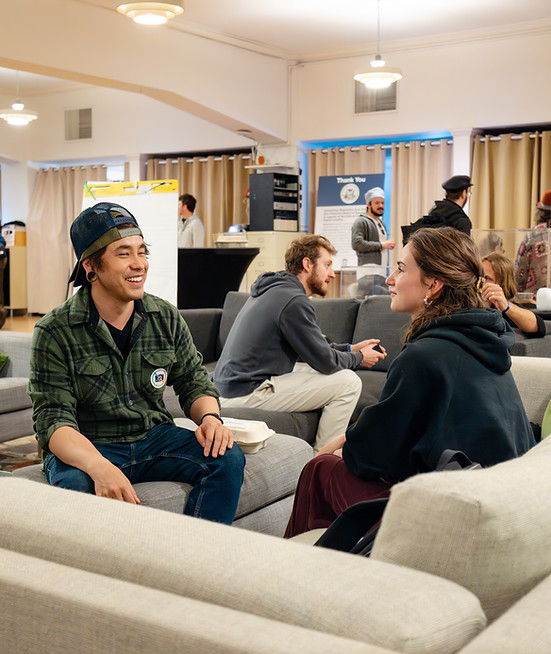
Weekly office hours with experienced builders
Talk through your challenges, get unstuck, or pressure-test an idea. You'll have access to people who've built core infrastructure, launched projects, and navigated the edge cases.
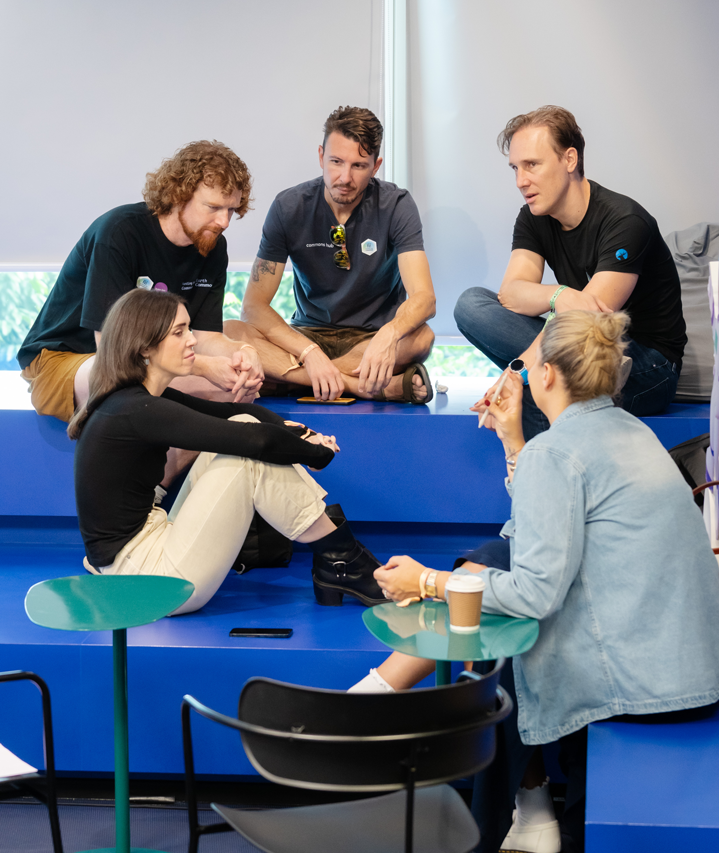
Hands-on workshops from supporting organizations
Expect sessions on technical tools, design principles, real-world use cases, and emerging coordination patterns—from people building in the open and learning as they go.
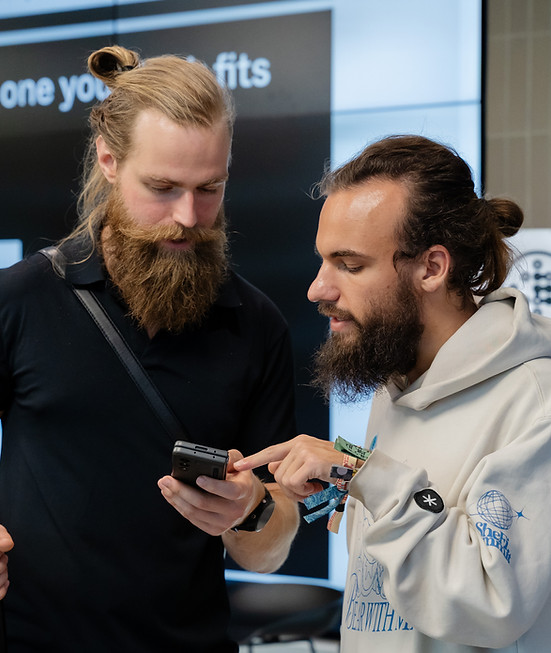
Midpoint check-in to share progress and get feedback:
Halfway through the hack, we’ll bring everyone together to share early demos, ask for help, and exchange ideas. It's a moment to recalibrate, connect, and build momentum heading into the final stretch.

All coordination through DevSpot:
DevSpot is going to be our home base. It’s where you’ll share updates, ask questions, post deliverables, and stay in sync with mentors, teammates, and the rest of the hack community.
Beethoven
Foundation
Fundación Beethoven is a music venue in Buenos Aires that brings people together through sound and community. Growing out of one of the city’s oldest music conservatories, it’s known for its intimate concerts and welcoming atmosphere—reflecting the commons through collaboration, openness, and shared enjoyment of culture.






This is your Testimonial quote. Give your customers the stage to tell the world how great you are!

This is your Testimonial quote. Give your customers the stage to tell the world how great you are!

This is your Testimonial quote. Give your customers the stage to tell the world how great you are!
Areas of Focus
We supported teams working on projects in areas including (but not limited to) the areas described below. See links for examples of projects our grantee community has worked on.
-
Coordination and Funding infrastructure
-
Stealth Donations & Meta-Addresses
-
Aggregation indexer for civic and public data
-
Sybil Attack Detection AI/ML Tool
-
Trustless apps
-
Quantitative and qualitative Impact Evaluators
-
Hypercerts: Impact Certification
Projects & Achievements from Berlin Residency
Residents contributed to the public goods funding ecosystem through their projects. The outputs included an open-source software tool, library, or system, along with a well-documented repository. We also encouraged participants to share their knowledge through blog posts or presentations at future Funding the Commons events
Past Hackathon
Virtual Hackathon 2023
From 1-30 September 2023, Funding the Commons hosted its first-ever Builder Residency — a transformative, month-long, immersive experience that took place in Berlin, Germany.
Attendees experienced the power of collaboration and innovation as builders and hackers came together to focus on the advancement of public goods funding infrastructure, impact evaluators, impact certification systems, and other elements of the public goods funding stack in both Web2 and Web3 applications.
We value open-source and the outputs of the residency are accessible and usable by the wider community, which is why we invited and accepted highly collaboration-minded individuals into our first (but certainly not last) residency program.

Testimonials
Community Love

Robert Rose
Speaker
This is your Testimonial section paragraph. It’s a great place to tell users how much you value your customers and their feedback.

Alex Smith
Robert Rose
This is your Testimonial section paragraph. It’s a great place to tell users how much you value your customers and their feedback.
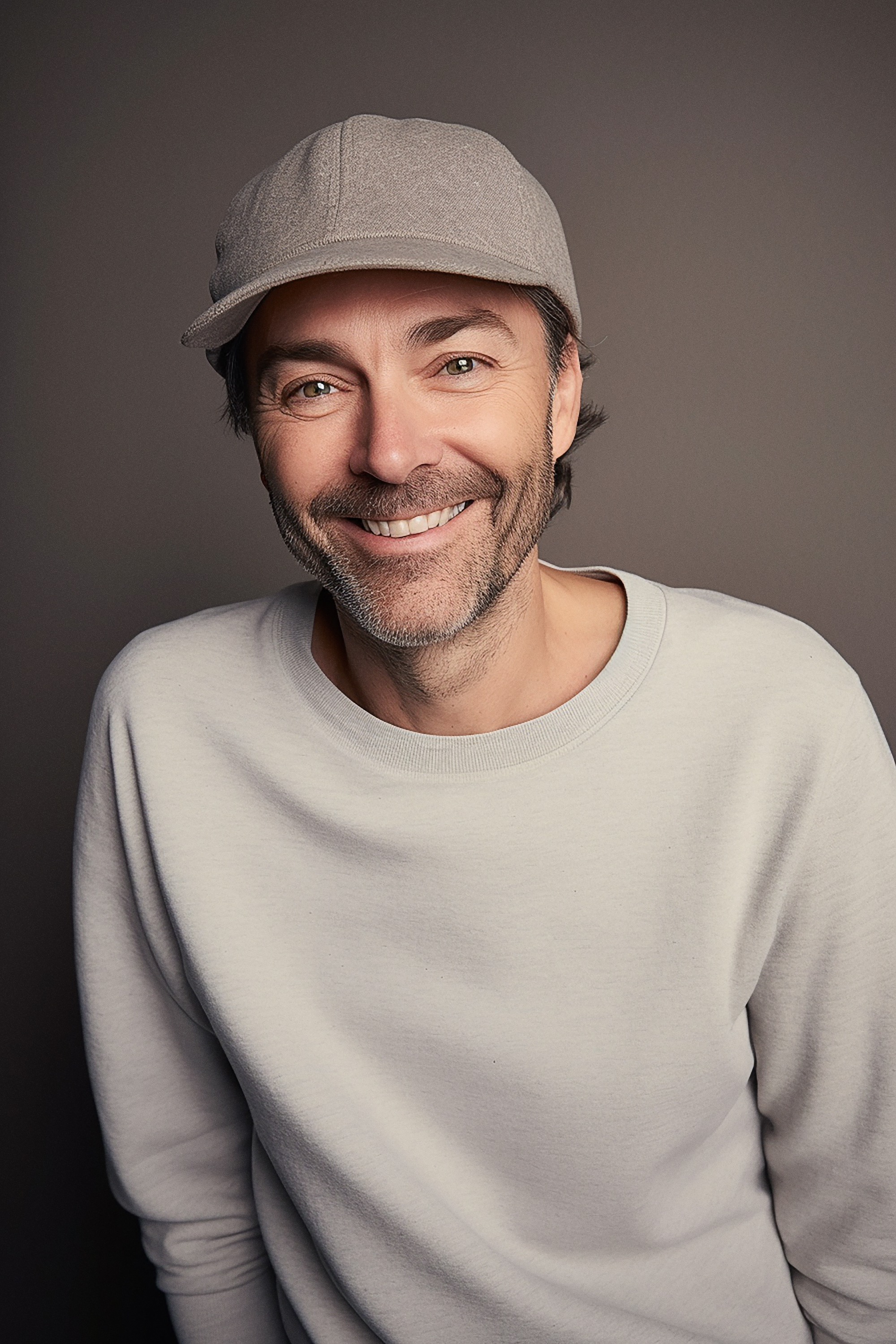
Drew Carlyle
Robert Rose
This is your Testimonial section paragraph. It’s a great place to tell users how much you value your customers and their feedback.

Jessica Davis
Robert Rose
This is your Testimonial section paragraph. It’s a great place to tell users how much you value your customers and their feedback.

























































































